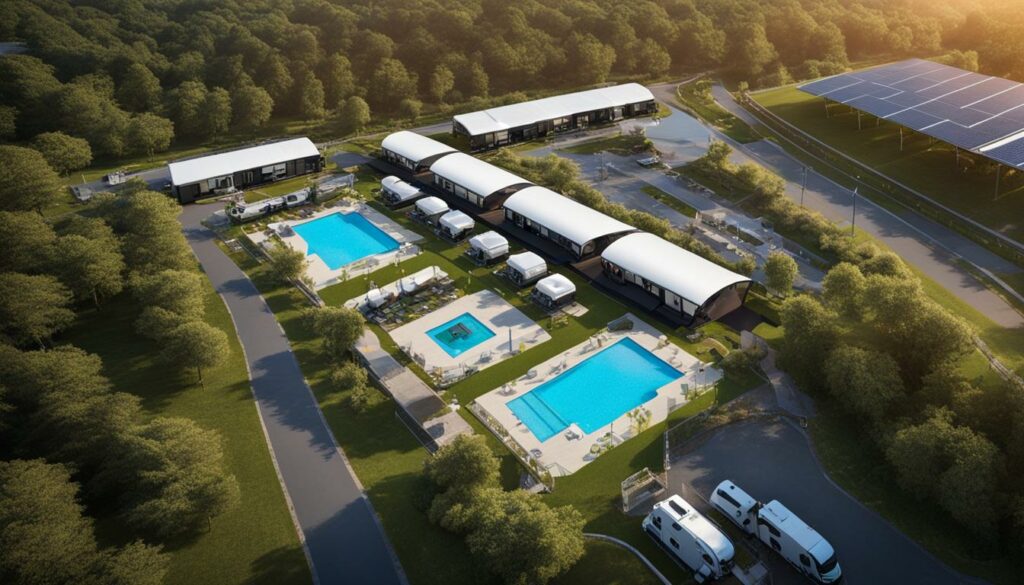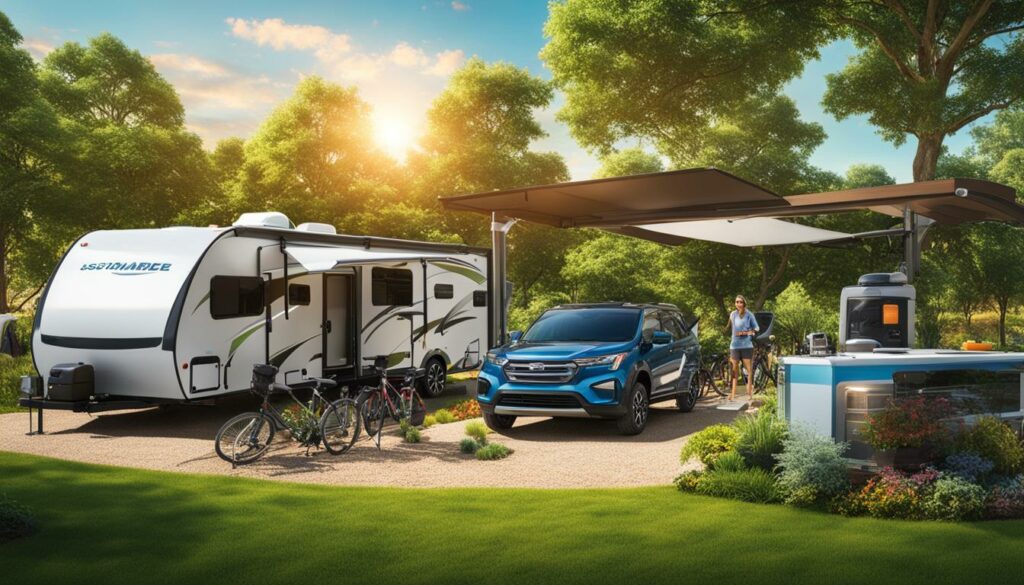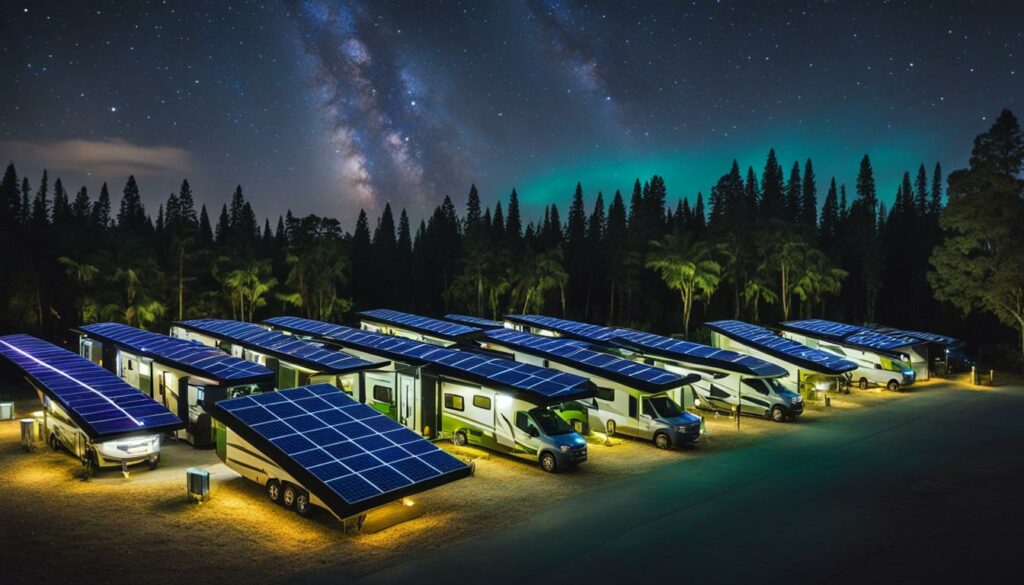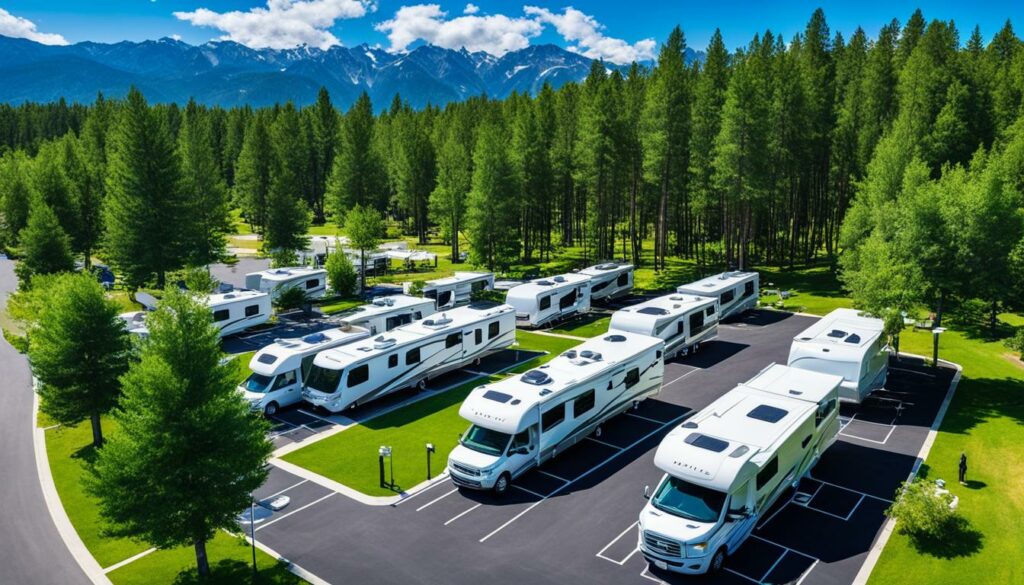Benefits of Energy Efficient Solutions for RV Parks
Implementing energy efficient solutions in RV parks can have numerous benefits for both owners and guests. One of the most significant advantages is the positive impact on the environment. By adopting sustainable RV park solutions and eco-friendly RV park solutions, park owners can reduce their carbon footprint and contribute to a greener future.
Moreover, energy efficient solutions can lead to substantial cost savings in the long run. For instance, incorporating energy saving solutions for RV parks such as solar panels, smart lighting, and water heating systems can significantly reduce energy consumption and utility bills. This, in turn, can lead to increased revenue and profitability for park owners.
Another benefit of energy efficient solutions is improved guest experience. Guests are increasingly seeking green solutions for RV parks and environmentally conscious facilities that align with their values. By enhancing sustainability practices, RV park owners can attract and retain eco-conscious travelers, resulting in a more satisfied and loyal customer base.
Components of Energy Efficient RV Park Infrastructure

In today’s world, eco-friendly and sustainable practices have become increasingly important. The same is true for RV parks, where implementing energy efficient solutions is not only responsible, but also financially savvy. In this section, we will explore the key components that contribute to an energy efficient RV park infrastructure.
Solar Panels
Solar panels are a popular and effective way to generate clean energy for RV parks. By converting sunlight into electricity, solar panels can significantly reduce the amount of energy required from traditional sources such as gas or coal. Additionally, solar panels can provide a reliable source of power, reducing the risk of power outages and enhancing the overall guest experience.
Energy-Efficient Lighting
Utilizing energy-efficient lighting is another critical component of an energy efficient RV park. LED lights that use significantly less energy than traditional incandescent bulbs can be integrated extensively throughout the park. Not only do they reduce energy costs and improve energy efficiency, but they also provide brighter light and last much longer than traditional bulbs.
Smart Meters
Installing smart meters to monitor electricity consumption is crucial to maintaining energy efficiency in an RV park. These meters measure energy use in real-time, enabling park owners to track and optimize usage and identify potential areas for improvement. This technology helps to promote energy conservation and reduce costs by providing a detailed insight into the usage patterns of various park amenities.
Electric Vehicle Charging Stations
Providing electric vehicle charging stations is another important feature of an energy efficient RV park. With the rise of electric cars, providing access to EV charging stations can enhance the overall guest experience, encourage eco-friendly travel, and attract eco-conscious customers. These stations can also be equipped with renewable energy sources to further improve energy efficiency.
Innovations in RV Park Energy Solutions
New energy-efficient solutions are being developed continuously for RV parks. These innovative solutions not only increase sustainability but also benefit cost savings and enhance the guest experience. One such development is the use of renewable energy sources for powering essential RV park services. Solar panels and wind turbines are commonly used to provide environmentally friendly power.
Energy management systems and smart technology integration is another area that has seen remarkable advancements. Smart meters that measure energy consumption can provide alerts when energy consumption exceeds a certain limit, helping park owners manage energy usage effectively. Moreover, the use of smart thermostats and smart lighting can help automatically control energy usage in different parts of the park.
The integration of these innovative solutions ensures that energy consumption in RV parks is optimized, and costs are minimized while providing a superior guest experience.
Advantages of Innovative RV Park Energy Solutions
| Benefits | Description |
|---|---|
| Cost Savings | The use of renewable energy sources and energy-efficient solutions can help RV park owners reduce their energy consumption and save costs on utility bills. |
| Improved Guest Experience | Implementing innovative energy solutions can help RV parks provide guests with modern, tech-savvy amenities while conserving natural resources. |
| Environmentally Friendly | The use of renewable energy sources and eco-friendly solutions helps reduce carbon footprint and make RV parks more sustainable. |
RV park owners can benefit immensely from the integration of innovative energy solutions. These solutions streamline operations, reduce costs, and promote sustainability—all while catering to the demands of modern travelers.
Best Practices for Implementing Energy Efficient Solutions
For RV park owners looking to implement energy efficient solutions, there are several best practices to keep in mind. By following these guidelines, RV parks can reduce their energy costs and environmental impact, all while providing a better experience for their guests.
Conduct Energy Audits Regularly
Performing regular energy audits can help identify areas where an RV park may be wasting energy. By tracking usage patterns and identifying areas of high consumption, owners can make informed decisions on where to prioritize energy-saving efforts.
Invest in Energy-Efficient Equipment
Upgrading to energy-efficient equipment, such as HVAC systems and lighting, can significantly reduce an RV park’s energy usage. While the initial investment may be high, the long-term cost savings and environmental benefits make it a worthwhile expense.
Promote Energy Conservation Among Guests
Encourage guests to adopt energy-saving habits during their stay. Simple steps like turning off lights when not in use, adjusting thermostat settings, and unplugging appliances when not in use can make a big impact on overall energy consumption.
“Adopting energy-efficient practices not only benefits the bottom line but also contributes to a more sustainable future.”
Take Advantage of Financial Incentives
There are various financial incentives available for RV park owners looking to implement energy efficient solutions. Programs such as the Energy Efficiency Rebate Program and the USDA Rural Energy for America Program provide funding and resources for eligible applicants.
Monitor and Track Energy Usage
Installing energy management systems and smart meters can provide real-time data on energy usage, enabling owners to identify areas where further efficiency improvements can be made.
Successful Energy Efficiency Projects in RV Parks

Implementing energy-efficient solutions can bring numerous benefits, as illustrated by the following case studies of RV parks that have successfully incorporated such measures:
Paradise RV Park: A Model of Sustainable Living
“Our guests appreciate our focus on sustainability and we’ve seen an uptick in return visitors since we implemented energy-efficient solutions. It’s a win-win situation for everyone.”
-Linda Johnson, Manager
| Energy-Efficient Solution | Result |
|---|---|
| Solar panels on rooftops | Reduced energy bills by 30% |
| LED lighting in all facilities | Reduced energy consumption by 40% |
| Smart water meters in all sites | Reduced water consumption by 25% |
Paradise RV Park’s energy-efficient solutions have not only resulted in substantial cost savings, but they have also attracted environmentally conscious guests who appreciate the park’s commitment to sustainability.
Green Acres RV Park: A Pioneering Approach to Energy Conservation
“We’re proud to be at the forefront of sustainable RV park management and look forward to continuing to implement innovative solutions that benefit both our business and the environment.”
-Tom Smith, Owner
| Energy-Efficient Solution | Result |
|---|---|
| Installation of electric vehicle charging stations | Attracts eco-conscious guests and increased revenue |
| Monitoring and adjusting energy usage in real-time | Reduced energy consumption by 15% |
| Education and promotion of sustainable practices among guests | Inspired guests to conserve energy and reduce waste |
Green Acres RV Park’s pioneering approach to energy conservation resulted in increased revenue, cost savings, and a significant reduction in the park’s environmental footprint.
These real-life examples demonstrate how energy-efficient solutions not only bring cost savings, but also improve the guest experience and make a positive impact on the environment. RV parks seeking to implement such solutions can draw upon the experiences of successful parks like Paradise RV Park and Green Acres RV Park.
The Future Outlook for Energy Efficient RV Parks

The use of energy efficient solutions in RV parks has become increasingly popular in recent years due to their cost savings and environmental benefits. As technology continues to advance, the future for energy efficient RV parks looks bright. Developers and designers are constantly exploring new ways to optimize energy consumption and reduce waste, creating solutions that are both effective and sustainable.
One area where we can expect significant advancements is in renewable energy sources. Solar panels are already a popular option for RV parks, but there is also potential for wind and hydroelectric power to be integrated into park infrastructure. Additionally, battery storage technology is rapidly improving, making it easier to store and distribute renewable energy.
Another trend to watch out for is smart technology integration. Smart devices such as thermostats, lighting systems, and meters can help RV park owners monitor and optimize energy consumption. They can also provide guests with a seamless and enjoyable experience, making energy conservation effortless.
As innovation continues, it is crucial for RV park owners to stay updated with industry developments and incorporate the latest technologies and trends in their energy efficiency strategy. This will not only drive cost savings and environmental benefits but also attract eco-conscious travelers who prioritize sustainability and want to stay at green, energy-efficient RV parks.
Table: Key Technologies and Trends to Watch for in Energy Efficient RV Parks
| Technology/Trend | Impact on Energy Efficiency |
|---|---|
| Solar panels | Provide a renewable source of energy and help reduce reliance on grid power |
| Smart meters | Enable precise measurement and management of energy consumption |
| Battery storage technology | Allows for the storage and distribution of renewable energy |
| Smart technology integration | Makes energy conservation effortless and improves guest experience |
| Wind and hydroelectric power | Provide additional renewable energy sources for RV parks |
Challenges and Solutions in Implementing Energy Efficient Solutions

Although implementing energy efficient solutions in RV parks can bring significant benefits, it can also pose several challenges that park owners should be aware of. One of the main challenges is the initial investment cost, which can discourage some park owners from exploring energy efficient solutions. However, there are several solutions that can help offset the costs, such as government incentives and financing options.
Another challenge is regulatory considerations. Depending on the location of the RV park, there may be specific regulations related to energy consumption that owners need to comply with. Staying up-to-date with these regulations can be challenging, but it is essential to avoid potential fines or legal issues.
Lastly, changing consumer expectations can pose a challenge in implementing energy efficient solutions. With increasing awareness and interest in sustainable practices, RV park guests may expect eco-friendly amenities and operations, which can require significant investment and changes in park infrastructure. However, by promoting the benefits of energy efficiency to guests and educating them on conservation practices, RV park owners can encourage a culture of sustainability and attract more eco-conscious travelers.
Overcoming the Challenges
To overcome the challenges of implementing energy efficient solutions, RV park owners can take several steps:
- Conduct a thorough energy audit to identify areas of high energy consumption and potential savings. This can provide a clear roadmap for implementing energy efficient solutions and projecting future cost savings.
- Invest in energy efficient equipment that can provide significant long-term savings, such as solar panels, LED lighting, and smart meters.
- Explore government incentives and financing options to offset initial investment costs.
- Stay up-to-date with regulatory considerations and compliance requirements to avoid potential legal or financial issues.
- Educate and train staff on energy efficiency practices and promote conservation among guests to encourage a culture of sustainability.
By taking these steps and staying apprised of the latest developments and innovations in energy efficient solutions, RV park owners can create a more sustainable and cost-effective operation while also meeting the changing expectations of guests.
Importance of Training and Education on Energy Efficiency
Effective implementation of energy efficient solutions requires more than just the right equipment and infrastructure. It also necessitates adequate knowledge and skill development for staff working at RV parks. Investing time and resources into educating staff about energy efficiency practices not only enhances day-to-day operations but also helps to promote sustainable behaviors among guests.
By offering training opportunities, RV park owners can ensure that their staff understand the benefits of energy efficiency and can effectively manage energy consumption on a day-to-day basis. This can include measures such as communicating with guests about energy-saving practices or using technology to monitor energy consumption. Equipping staff with the skills to make informed decisions on how to reduce energy waste will ultimately lead to cost savings and customer satisfaction, while also contributing to a more sustainable future.
The Benefits of Staff Training on Energy Efficiency
RV park owners who invest in staff training on energy efficiency can see widespread benefits. Not only can it lead to positive environmental outcomes, but it can also result in cost savings and improved visitor experiences.
Cost Savings: By training staff to become more aware of energy consumption and waste within the RV park, owners can reduce energy bills and lower operational expenses. This can help ensure the long-term sustainability of the park while also enhancing profitability.
Improved Guest Experiences: By providing staff with the knowledge and skills to manage energy consumption effectively, RV park guests can experience better amenities and greater comfort levels. By prioritizing sustainability and energy efficiency, RV parks can attract eco-conscious travelers who seek out environmentally friendly destinations.
Enhanced Reputation and Branding: By emphasizing energy efficiency and implementing sustainable practices, RV park owners can build a positive reputation and generate interest among visitors who prioritize eco-friendly destinations.
Education and training on energy efficiency practices is an essential component of effective energy management in RV parks. By investing in staff education and training, RV park owners can increase the overall efficiency of their operations, improve their customer experience, and contribute to the global movement towards sustainability.
Government Support for Energy Efficiency in RV Parks
RV park owners can take advantage of various government initiatives and incentives designed to promote energy efficiency. These initiatives aim to reduce the carbon footprint of RV parks and make them more sustainable for future generations.
One such initiative is the Sustainable RV Park Solutions program, which offers grants and low-interest loans to help RV parks implement energy-efficient solutions such as solar panels, energy-efficient lighting, and electric vehicle charging stations. Another initiative is the Eco-friendly RV Park Solutions program, which provides tax credits to RV parks that implement sustainable practices.
RV park owners can also benefit from tax incentives offered by local governments for implementing energy-efficient solutions. These tax incentives can help offset the initial costs of investment and make energy-efficient solutions more accessible to RV parks of all sizes.
By taking advantage of these government initiatives and incentives, RV park owners can not only reduce their carbon footprint but also save on energy costs in the long run. They can also attract eco-conscious travelers who prioritize sustainable practices when selecting their travel destinations.
Conclusion
In conclusion, implementing energy efficient solutions in RV parks is a smart move for both the environment and the bottom line. By taking steps to optimize energy consumption, RV park owners can benefit from cost savings, increased guest satisfaction, and a positive impact on the planet.
Key components of an energy efficient RV park infrastructure include solar panels, energy-efficient lighting, and smart meters, among others. RV park owners can also take advantage of the latest innovations in renewable energy sources, energy management systems, and smart technology integration to further streamline operations and reduce energy consumption.
Although there may be initial investment costs, government initiatives and incentives are available to offset these expenses. In addition, investing in staff training and education can help promote sustainable behaviors among guests and improve overall energy efficiency.
As the industry continues to evolve, it is important for RV park owners to stay updated on emerging technologies and trends that may shape the future of energy management. By embracing energy efficient solutions, RV parks can not only reduce their environmental impact but also improve their bottom line and enhance the guest experience.
Overall, energy efficient solutions for RV parks are both environmentally responsible and cost-effective. By adopting best practices and staying informed on industry developments, RV park owners can take advantage of these benefits and position themselves for long-term success.
FAQ
What are the benefits of energy efficient solutions for RV parks?
Energy efficient solutions for RV parks offer several advantages. They contribute to a more sustainable and eco-friendly environment, reduce operational costs by lowering energy consumption, and enhance the overall guest experience. Implementing these solutions can also attract eco-conscious travelers who value environmentally responsible destinations.
What are the key components of energy efficient RV park infrastructure?
Energy efficient RV park infrastructure encompasses various components. These include solar panels for renewable energy generation, energy-efficient lighting systems to minimize electricity usage, smart meters for precise energy monitoring, and electric vehicle charging stations to support eco-friendly transportation options. Integrating these components into the park’s design is crucial to maximize energy efficiency.
What innovations can be found in RV park energy solutions?
RV park energy solutions continue to evolve with innovations aimed at optimizing efficiency. Advancements in renewable energy sources, such as wind and geothermal, provide alternative and sustainable power options. Energy management systems with smart technology integration allow for better control and monitoring of energy consumption. These innovations streamline operations, reduce costs, and improve the overall sustainability of RV parks.
What are the best practices for implementing energy efficient solutions in RV parks?
Implementing energy efficient solutions in RV parks involves various best practices. Conducting energy audits can help identify areas of improvement. Investing in energy-efficient equipment and appliances reduces energy consumption. Promoting energy conservation among guests through education and incentives is also crucial. Additionally, exploring financial benefits and incentives available for adopting these practices can further support the implementation process.
Can you provide examples of successful energy efficiency projects in RV parks?
Certainly! There are numerous successful energy efficiency projects in RV parks. For example, some parks have implemented solar panel systems that significantly reduce their reliance on the grid. Others have switched to energy-efficient lighting throughout the park, resulting in substantial energy savings. These projects have not only helped reduce operating costs but have also improved the guest experience by promoting sustainability.
What does the future hold for energy efficient RV parks?
The future of energy efficiency in RV parks looks promising. Advancements in technology and emerging trends, such as energy storage solutions and the integration of smart grids, will further optimize energy management. These developments will contribute to even greater energy savings and enhanced sustainability in RV parks. It is crucial for park owners to stay informed about these advancements and embrace them to stay competitive in the industry.
What challenges may arise when implementing energy efficient solutions in RV parks?
Implementing energy efficient solutions in RV parks may present challenges. Initial investment costs can be a barrier, especially for smaller parks. Compliance with regulations and codes related to renewable energy installation and electrical systems can pose additional challenges. Additionally, adjusting to changing consumer expectations and preferences for sustainable and energy-efficient accommodations may require some adjustments. However, with proper planning and support, these challenges can be overcome.
Why is training and education on energy efficiency important for RV park staff?
Training and educating RV park staff on energy efficiency practices are crucial for effective energy management. Staff members who are knowledgeable about energy-saving techniques can implement sustainable practices throughout the park. They can also educate and encourage guests to participate in energy conservation efforts, fostering a culture of sustainability. Ultimately, staff training enhances operational efficiency, reduces energy wastage, and promotes a greener environment.
What government support is available for energy efficiency in RV parks?
Government support for energy efficiency in RV parks comes in various forms. Many governments offer programs and grants specifically designed to encourage energy efficiency initiatives. Additionally, tax incentives and rebates are often available to offset the costs of implementing energy efficient solutions. RV park owners should explore these government offerings to leverage financial support and accelerate their transition to energy-efficient practices.
How would you summarize the importance of energy efficient solutions for RV parks?
Energy efficient solutions are vital for RV parks to achieve sustainability, cost savings, and improved guest satisfaction. By implementing renewable energy sources, energy-efficient infrastructure, and adopting best practices, RV parks can significantly reduce their environmental footprint and enjoy long-term financial benefits. The future outlook for energy efficient RV parks is promising, with continuous advancements and government support. It is essential for RV park owners to embrace these solutions and stay proactive in their pursuit of energy efficiency.





